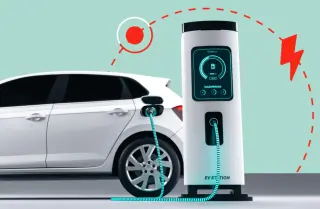
With over 1.19 million fully electric vehicles now on UK roads, electric driving is no longer a niche, it’s the new norm. As more individuals and businesses transition to EVs to reduce carbon emissions, the need for convenient, efficient, and secure charging solutions has never been greater.
For fleets, this means ensuring drivers can easily access public EV chargers and manage payments seamlessly. That’s where EV charge cards, also known as RFID cards, come in.
These cards provide access to thousands of public charging points across the UK and deliver consolidated, HMRC-approved invoicing, cutting down on admin and helping you keep control of fuel expenses. Even plug-in hybrids can benefit.
In this guide, we’ll break down how RFID works, why EV charge cards are essential for fleets, and how to get started.
What is RFID?
Radio Frequency Identification (RFID) is a contactless technology that uses radio waves to identify and track items. It comprises a tag (embedded with a microchip and antenna) and a reader, which communicates with the tag wirelessly.
RFID has a wide range of applications, such as:
Inventory management in retail and logistics
Animal tracking via microchips
Access control for secure buildings
Public transport systems, toll payments and, of course, EV charging
Learn more from industry sources like BP Pulse’s RFID explainer.
What is an RFID card for EV charging?
An RFID card for EV charging is a type of smart card embedded with RFID technology. It allows EV drivers to access compatible charging stations across different networks without needing multiple apps or contactless payments.
For fleet users, RFID cards streamline transactions across all vehicles and offer:
Centralised, VAT-approved invoicing
Spending controls (e.g. limits and restrictions)
Secure payments with fraud protection
Simple integration into account management systems
EV charge cards also eliminate the need to reimburse drivers or juggle receipts.
How much does EV charging cost with an RFID card?
Instead of a standalone section, we’ve included this essential info here:
The cost of EV charging depends on the network and charger type. As of 2025, an ultra-rapid public charger typically costs around 79p/kWh. With an RFID card:
You pay the retail price, plus a small transaction fee
There are no interest charges, unlike traditional credit cards
Spending caps and fuel-type restrictions can be applied for tighter control
Benefits of EV charge cards
For both fleet managers and business drivers, EV charge cards offer tangible benefits:
Widespread access to thousands of public chargers across various UK networks
All-in-one invoicing for EV and traditional fuel use
Admin simplicity and reduced paperwork
Cost control with detailed usage reporting
Improved security by eliminating the need for personal payment methods
Types of EV charge cards available
At Right Fuel Card, we offer two flexible options:
BP Fuel and Charge Card
Access to 12,000+ charge points, including BP Pulse and Osprey
Accepted at all BP fuel stations, even on the motorway
Great for mixed fleets using petrol, diesel and electric
Shell Fuel and EV Card
Access to 23,000+ charge points, including Shell Recharge locations
Usable at participating Aldi and Waitrose supermarkets
Part of Shell’s expanding EV infrastructure
You can compare these options on our EV charge card page.
We’ve also partnered with Rightcharge, giving our customers access to their EV home charging and installation services. Learn more about our Rightcharge partnership.
How to choose the best RFID card for EV charging
When selecting an RFID card, consider:
Coverage: Does the network cover your routes and charging needs?
Pricing structure: Review membership fees, overstay penalties, and energy rates
Charging speed: Fast chargers (Level 3/DC) are ideal for quick turnaround times
Extras: Loyalty rewards, app access, and smart charging features can offer more value
Compare options with tools like this RFID card comparison guide.
How to get an RFID card for EV charging
Getting started is simple:
Request a callback from our team.
We’ll recommend the best option based on your fleet and location.
You’ll need:
Proof of address (x2)
Proof of ID (x1)
A successful business credit check
Once approved, your card will arrive active and ready to use. You can use our site locator tool to find compatible stations.
You can also check out Shell Recharge and BP Pulse's locator for network-specific coverage.
Tips for maximising your EV charge card
To get the most out of your card:
Know your network: Familiarise yourself with where you can charge
Track usage: Use our online portal to review costs and habits
Charge off-peak: Where possible, to save money
Use apps: Shell and BP both offer mobile apps to find stations and manage sessions
Match charging to needs: Use fast chargers for tight schedules and slower ones when parked for longer
Future trends in EV charge cards
The EV charging industry is evolving rapidly. Expect:
Greater interoperability: One card for many networks
Digital integration: EV cards linked to wallet apps and smartphones
Subscription models: With tiered benefits for frequent users
Simplified driver experience: Fewer apps, more convenience
“The collaboration of EV networks will negate the need for multiple apps and cards. This makes EV charging much more practical and addresses the concerns that some drivers may have about switching to electric.”
– Matthew Dodds, Head of Strategic Sales & Partnerships, Right Fuel Card
Start your EV journey today
Ready to simplify EV charging for your business? Compare our wide range of charge cards to find the best fit for your fleet.




